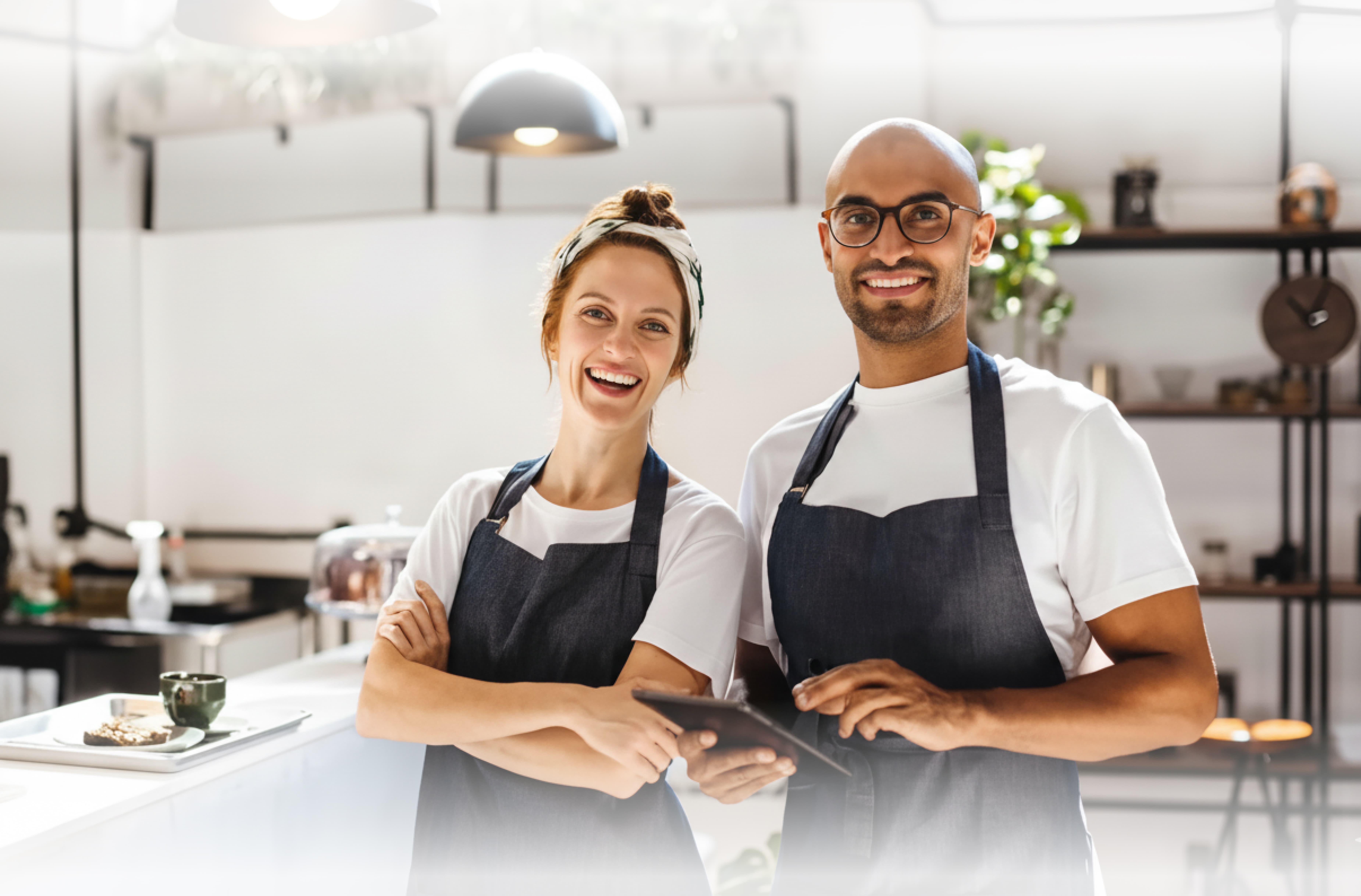Key Takeaways
- Online ordering is essential for growth: With the global food delivery market surging, having a reliable online ordering system is critical for improving efficiency, customer loyalty, and profits.
- Customers expect convenience and speed: A smooth, customizable, and fast ordering experience directly impacts repeat business and brand reputation.
- Top platforms cater to different needs:
- Restolabs – Best overall for customization, zero commissions, and fast setup.
- Owner.com – Great for marketing automation but expensive for small restaurants.
- GloriaFood – Ideal for beginners seeking a free or low-cost entry.
- Toast – Best for restaurants already using its POS ecosystem.
- BentoBox – Great for branding and design-focused restaurants.
- Lunchbox – Good for multi-location businesses needing marketing tools.
- Menufy, Square, ChowNow, and Olo – Offer flexible, scalable options depending on size and budget
- Choose based on your restaurant type and goals: Evaluate integration, scalability, and pricing before selecting a platform.
- Data ownership matters: Owning customer data enables personalized marketing and long-term loyalty.
- Restolabs stands out as an affordable, commission-free solution that helps restaurants control their digital presence, streamline operations, and boost direct orders.
Picture this: It's Friday night, and a family is casually scrolling through their phones, craving a delicious meal. They quickly discover your restaurant, browse your enticing menu, customize their order, and pay—all in just a few seconds—and start tracking their delivery. Yet, despite this seamless experience, many restaurants struggle to keep up, facing challenges like high third-party commissions, lost customer data, and cumbersome manual processes that hold them back.
Now, imagine another scenario where they stumble upon a slow ordering platform. Frustration mounts as they struggle to navigate through the clunky menu. After wasting too much time, they abandon the idea of ordering from your restaurant and quickly turn to a competitor, eager to find a smoother, faster experience.
What do you think makes the difference?
Customers are still looking for more than just good food. They need convenience, customization, and speed in online ordering. To meet all of this, you need an excellent ordering system.
With global online food delivery expected to hit $1.45 trillion by 2027, investing in innovative ordering solutions is no longer optional. Choosing the right online ordering system for restaurants that aligns with your operations is crucial. It helps build customer loyalty, streamline operations, and eliminate high commissions.
The benefits of implementing a robust online ordering system extend far beyond convenience. Restaurants gain unprecedented access to valuable customer data for targeted marketing, dramatically reduce order errors that plague phone-based systems, streamline operations by automating repetitive tasks, and create new revenue opportunities through strategic upselling. With the global online food ordering market projected to reach $365 billion by 2030 and 63% of consumers stating they prefer ordering directly from restaurants rather than third-party apps, investing in your own online ordering platform isn't just smart—it's essential for sustainable growth in the competitive restaurant industry.
In this blog, let’s explore how the right platform solves these challenges and transforms your restaurant’s online future.
What Are Online Ordering Platforms?
Online ordering platforms are specialized software systems that enable restaurants to receive and process food orders digitally without relying on phone calls or in-person interactions. These systems typically feature a user-friendly interface where customers can browse your complete menu, select items, customize their orders with special instructions or modifications, and complete payment—all through your restaurant's website or dedicated mobile application.
When a customer places an order, the system instantly transmits it to your restaurant's point of sale (POS) system or dedicated order management interface. Your staff receives clear, accurate order details including customizations, delivery instructions, and customer information. Most platforms also automatically send confirmation notifications to customers and provide real-time order status updates.
Modern online ordering platforms support both delivery and pickup options, allowing restaurants to configure service areas, set minimum order values, and manage preparation times based on order volume. The best systems integrate seamlessly with existing restaurant technology, creating an efficient digital ecosystem that enhances both customer experience and operational efficiency.
Top Online Ordering Systems for Restaurants
Here is a handpicked list of the top 6 online ordering systems that can streamline your process. Ready to learn about their features, pros and cons, and ratings? Dig in!
Comparison Table: Top Online Ordering Platforms
1. Owner.com
If you run a mid-sized restaurant and are looking to grow your brand and increase online orders, Owner.com might seem like a good fit. While Owner.com can effectively drive more online traffic and sales, the ongoing expenses may be a significant concern for restaurant owners aiming to expand without overextending their budgets.

Pros:
- Builds customized landing pages and mobile apps that reflect your restaurant’s personality, making it easy for customers to order.
- Connects with DoorDash’s driver network to handle deliveries, so you can focus on your restaurant while they handle logistics.
- Sends automated email and text campaigns to keep your customers engaged and coming back for more.
- Provides real-time data to help you understand your customers and make smarter decisions for your business.
- Promotions and discounts are easy to set up on your website, keeping customers excited about your offers.
- You can easily update menus and manage orders without any technical skills.
Cons:
- Despite Owner.com’s claim to cater to small and medium-sized businesses, their $499 monthly subscription fee is among the highest in the market, resulting in higher recurring expenses for restaurants.
- They have a significant upfront setup fees in the range of $1000 to get started. Plus each new location incurs a $299 subscription fee, which can quickly add up to restaurant owners looking to expand.
- Owner.com charges a 5% commission on every order, which is typically passed on to the customer. While this may seem like a non-direct cost to the restaurant, it can negatively impact customer retention. Furthermore, it can place restaurants at a competitive disadvantage, especially when alternative platforms like Restolabs have no additional fees.
- According to customer reviews on accredited sites like G2, they lack strong integrations with key POS systems, payment processors, and loyalty programs.
- Users have reported that they could benefit from better customization tools for branding.
What Customers Say:
“I’m Ranjith, owner of Tomatoes II Pizzeria in Carnegie, Pennsylvania. Owner.com helped me cut costly third-party commissions and build loyalty through personalized offers. Their online ordering system for restaurants has a user-friendly website and insightful dashboard transformed my business, while their team, especially Eva Peter, provided exceptional support. Owner.com’s fair and transparent approach makes them a standout partner for restaurant owners. Highly recommend!”
Customer Rating: 4.9 / 5
2. GloriaFood
If you’re running a small restaurant and need an online ordering platform that’s easy and budget-friendly, GloriaFood could be just what you’re looking for. It’s simple to set up, free for pickup, and helps you begin without a hitch.

Pros:
- Helps you with upselling dishes by highlighting popular items and suggesting extras at checkout.
- Offers basic delivery management tools to maintain smooth operation.
- Lets you create basic deals and discounts.
- Access to reliable customer service.
- Adding photos, updating your menu, and creating deals is smooth sailing.
- Since they prioritize mobile functionality, it is easy for customers to order directly from their smartphones.
Cons:
- The free plan has limited capabilities, allowing only for pickup operations. You can't process payments through your online portal and must handle them in-house during pickup, which hinders your ability to meet evolving customer needs.
- While the platform advertises as free, to run your online ordering operation, there is a $29 per month subscription fee to accept and process online payments.
- The product's limited customization options may not accommodate the needs of restaurants with more demanding operations.
- According to reviews on trusted sites like G2, some customers have run into issues with POS integrations and find the design choices to be quite limited.
What Customers Say:
GloriaFood has revolutionized our online ordering system, making it seamless and user-friendly for both our staff and customers. It has significantly enhanced our efficiency and customer satisfaction, Team Pez Gallo, Pez Gallo Sushi & Cevicheria
Customer Rating: 4.6 / 5
3. RestoLabs
RestoLabs can be your ideal partner if you’re seeking high-level customization, a clear brand identity, and maximizing profits through direct orders without incurring high costs. Bonus? You can launch your online ordering site within a week!
At RestoLabs, we're here to help your restaurant shine with its very own branded ordering system. You'll build direct connections with your customers and avoid those high third-party fees. Additionally, our user-friendly tools and dedicated support team make setting up an online ordering system effortless, regardless of your restaurant’s size.
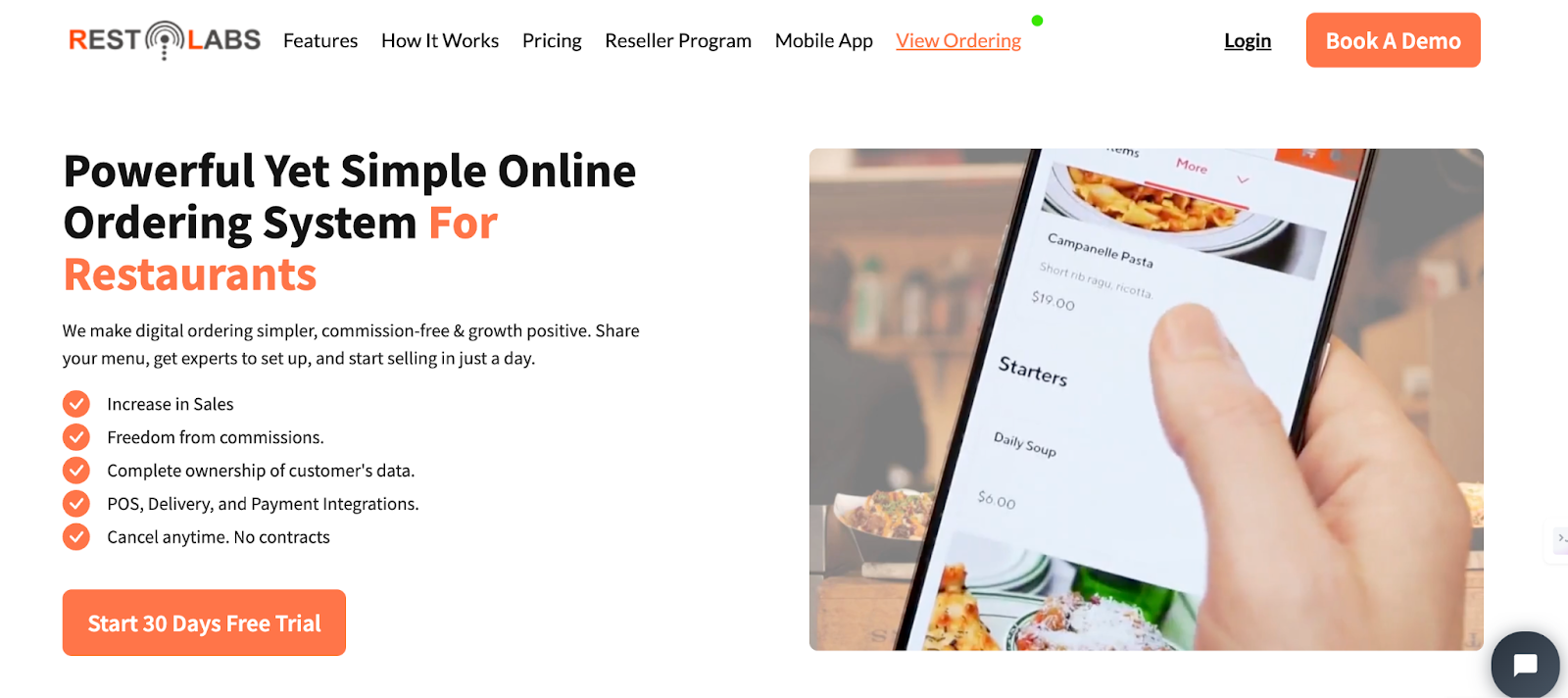
Pros:
- Find your customers wherever they are - through websites, mobile applications, social media, or even through QR code dine-in ordering.
- Take control of your deliveries with optimized solutions for managing delivery areas, busy hours, and peak times using radius and zipcode-based map tools.
- Restolabs analytics offers deep insights into sales, customer behavior, and product trends, enabling precise forecasting of peak hours and consumer preferences. This empowers businesses to tailor promotions, boost engagement, and make informed, strategic decisions for growth.
- With over 100 integrations, Restolabs effortlessly connects your online ordering system to your POS.
- Restolabs supports more than 10 languages, allowing you to seamlessly serve a diverse and global customer base.
- With our customizable menu dashboard, you can quickly update menus, easily create combo deals, and effortlessly manage orders, all without needing technical expertise.
- Automated order throttling lets you limit incoming orders, improving efficiency and preventing overloads during peak times.
- With PCI compliance, Restolabs provides secure and reliable payment processing, ensuring smooth transactions, building customer trust, and reducing the risk of fraud.
- Restolabs ensures your ordering site looks great and works smoothly across all devices, from smartphones to desktops, providing a great user experience for your customers.
- Restolabs robust integration with loyalty programs drives customer engagement, fosters brand loyalty, and encourages repeat visits with rewards, gift cards, personalized offers, and loyalty points.
Cons:
- The website design templates have fewer options compared to other design-centric platforms.
- Loyalty program features can be expanded basis the need.
What Customers Say:
Pedro Luis A., Restaurant Manager at Etxanobe Restaurant, shares his experience:
“RestoLabs is highly functional and easy to use, especially with its predesigned templates that simplify menu customization for users like me. It offers great value for money and fits our business needs perfectly, ensuring reliable service. Whether creating a custom menu, improving customer experience, or boosting efficiency, RestoLabs consistently delivers results for restaurant owners like us.”
Customer Reviews: 4.7 / 5
4. Toast
Looking for a solution to manage both online ordering and in-house operations? Toast simplifies workflows and helps improve efficiency for both staff and customers. It is designed to work exclusively for restaurants using its POS system.
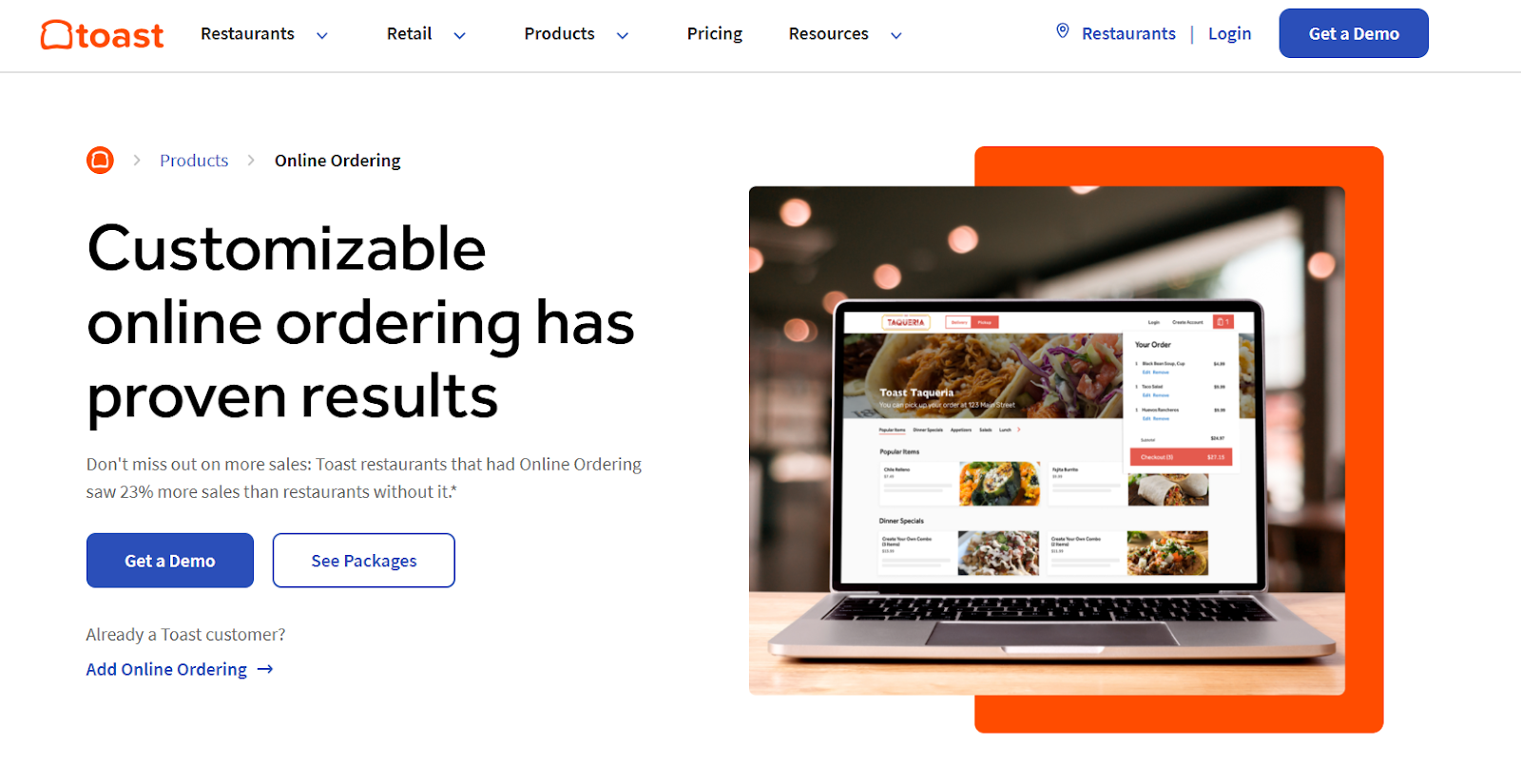
Pros:
- Online ordering can be integrated directly with its POS system, so orders from dine-in, takeout, and delivery are managed in one place.
- Provides loyalty tools to create and manage promotions, and discounts to keep customers coming back.
- Features a user-friendly interface that makes it easy for customers to place orders online and for staff to manage them seamlessly.
- Includes detailed analytics to give you insights into sales, popular menu items, and customer preferences, helping you make data-driven decisions.
- The platform enables easy updates to menus, including pricing and item availability, ensuring consistency across all ordering channels.
- Toast ensures secure transactions with data protection.
Cons:
- Toast focuses mainly on its POS system, which makes its online ordering features less robust and flexible compared to those of dedicated platforms.
- Toast’s online ordering platform is exclusive to its POS users and cannot be used independently, limiting its reach to a broader customer base.
- Many users have expressed frustration with Toast’s slow and unresponsive support, with complaints frequently shared on Reddit and other forums.
- With significant setup costs and ongoing fees, Toast is better suited for restaurants that can fully leverage its more involved features.
What Customers Say:
“Toast has changed the way we operate. We try to do double points on times we are not as busy, to encourage customers to come in and get more points. Mondays from 2-4 were not as busy, but bringing email marketing and loyalty program in really did make our restaurant a lot busier than we would be on a regular Monday”, said The Vasquez brothers of Oscar’s Authentic Mexican Grill.
Customer Rating: 4.2 / 5
5. BentoBox
Want to take your restaurant's online identity up a notch? BentoBox might be the right solution for you. It’s designed to help you showcase your restaurant’s unique brand, attract more customers, and streamline your digital operations.
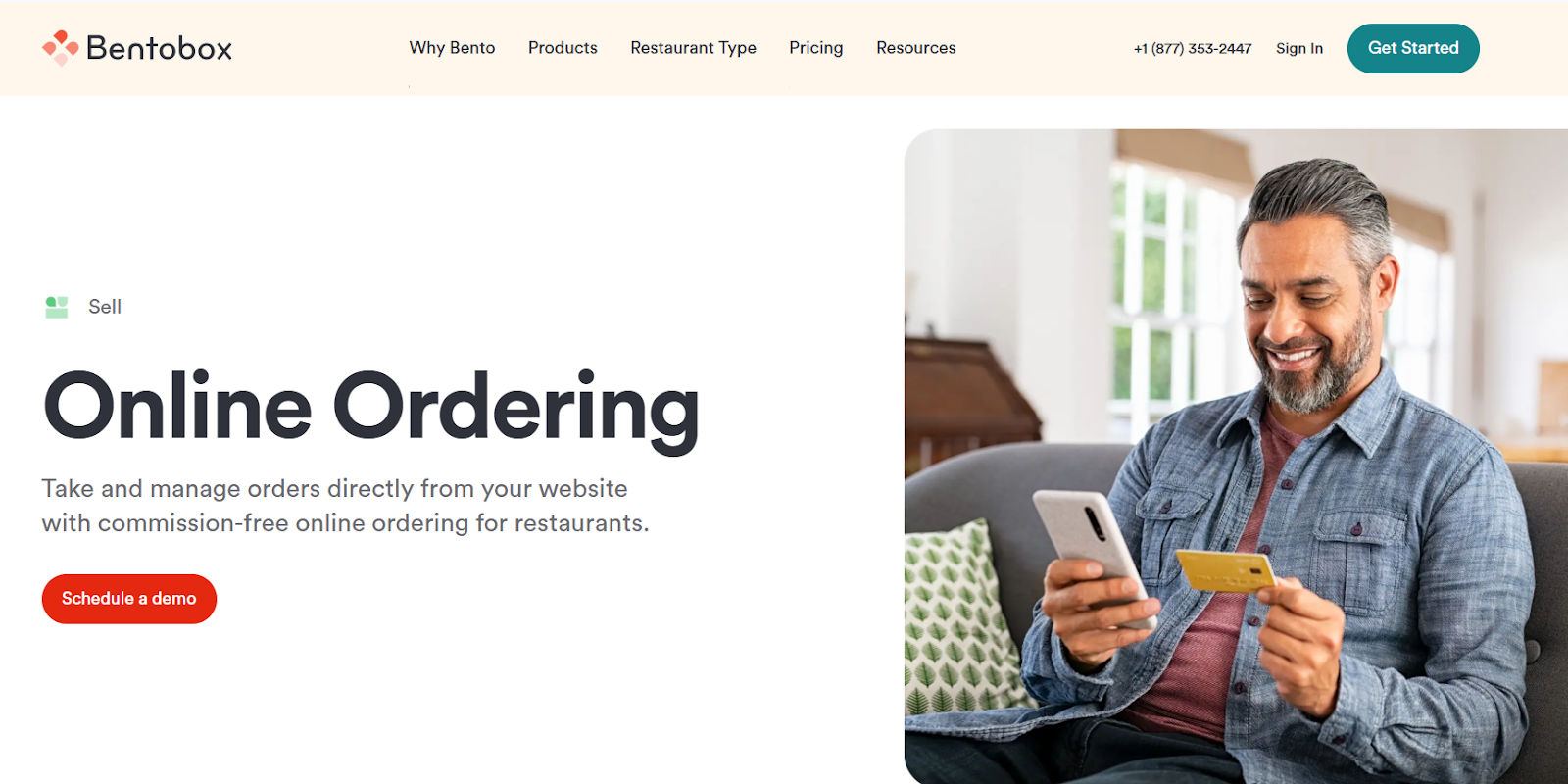
Pros:
- Creates visually appealing websites that reflect your restaurant’s style, making a great first impression on visitors.
- Helps manage reservations and events, offering tools to manage them online.
- Supports gift card sales and merchandise, providing additional revenue streams for your restaurant.
- Offers basic email marketing and SEO tools to help you reach more customers and grow your audience.
- Simplifies table reservations with a user-friendly platform.
Cons:
- Bentobox's pricing structure is not upfront, requiring potential customers to sign up for a demo or express interest before revealing costs. This hidden pricing model can be frustrating for restaurant owners who prefer transparency upfront.
- BentoBox charges an additional $40-$60 per month for online ordering, making it pricier beyond their foundation plan.
- With BentoBox, while updating your menu and promotions is straightforward through their simple dashboard, you'll often need to rely on their support team for website setup and managing your ordering portal.
- BentoBox's backend UI/UX lacks intuitiveness and feels a bit convoluted, making it less user-friendly.
- BentoBox has a lengthy setup process for launching the ordering platform and website, yet restaurants are still billed the monthly subscription fee during this waiting period.
- Some integrations with other software systems could involve additional costs and setup time.
What Customers Say:
John Gonzalez, The Manager at Señor Burrito says, “BentoBox has been fantastic for our restaurant. When a customer orders from the website, there’s no tablet involved — the ticket just prints out from our POS. We can see that it’s an order from BentoBox, when they need it, the person’s name, their contact info. Everything we need.”
Customer Rating: 4.4 / 5
6. LunchBox.io
Lunchbox is a restaurant online ordering platform that offers flexible solutions to simplify online ordering, marketing, and customer loyalty. It allows customers to order through your website or mobile app, providing a seamless user experience. By synchronizing orders from multiple channels, including third-party delivery apps, Lunchbox makes order management effortless.
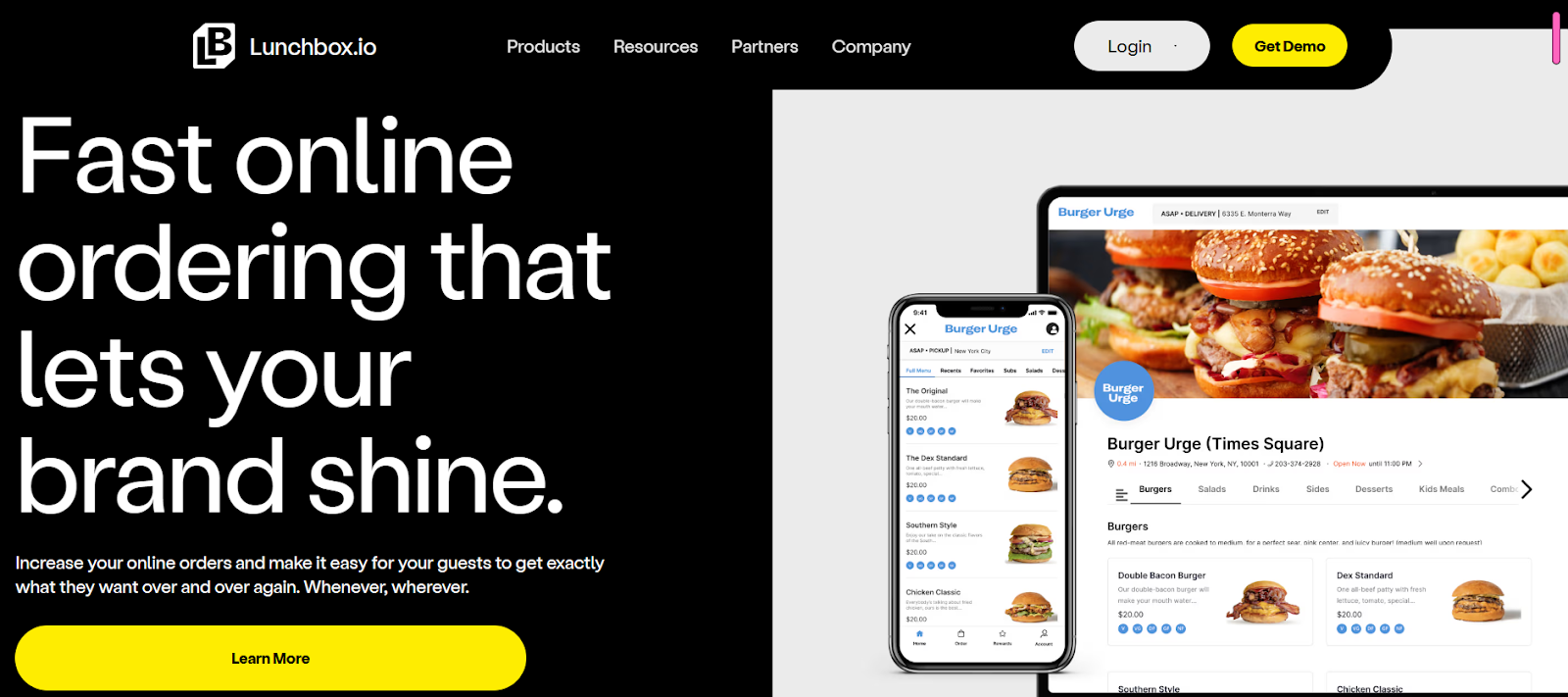
Pros:
- Create personalized loyalty programs and build strong customer relationships that encourage your customers to come back.
- Send tailored emails, texts, and push notifications to engage your customers effectively.
- Scan-to-pay features make the payment process smoother for your customers.
- Manages multi-location sales orders, menus, and reports from a single dashboard to ensure consistency and ease of management.
Cons:
- Customers encounter difficulties with menu updates, order notifications, and delivery systems, hindering operational efficiency.
- Essential features such as SMS notifications, loyalty tools, and menu modifications offer limited functionality.
- Integrating with POS systems and other essential tools have proved to be complex, requiring additional time and resources.
- The slow onboarding process and delayed response times negatively impact the customer experience.
- Despite its sleek design, the platform experiences technical glitches, and customization options are limited, reducing flexibility for users.
- Ongoing issues with autorenewals and high cancellation penalties, create uncertainty for users.
- The lack of pricing transparency, leads to unpredictability for growing businesses.
What Customers Say:
“One of the reasons we chose Lunchbox is because I felt that there was good synergy in terms of how we approach work – responsive, quick, smart.” - Brian Helfrich, CEO, Summit Coffee.
Customer rating: 1.5/5
7. Menufy
For restaurants seeking a balance between affordability and functionality, Menufy offers a compelling solution with its straightforward pricing structure and nationwide delivery network. The platform specializes in helping independent restaurants establish online ordering with minimal upfront investment.

Pros:
- Zero setup fees and flexible monthly plans starting from a commission-only model to a flat $99/month subscription
- Integrated delivery service available in over 650 cities without requiring your own drivers
- Seamless integration with over 30 popular POS systems including Toast, Square, and Clover
- Customizable menu with easy photo uploads and modifier options
- Free marketing tools including social media integration and QR code generation
- 24/7 customer support with dedicated account managers
Cons:
- The commission-based plan charges 12.5% per order, which can become expensive as order volume increases
- Limited customization options for the ordering interface compared to more premium platforms
- Basic analytics capabilities that may not satisfy data-driven operators
- Mobile app experience isn't as robust as some competitors
- Limited loyalty program features without advanced segmentation capabilities
Pricing: Flexible options including a commission-only model (12.5% per order) or a flat $99/month subscription with 0% commission.
Integrations: Supports 30+ POS systems including Toast, Square, Clover, Lightspeed, and Revel.
What Customers Say:"Menufy helped us launch online ordering in just three days. Their POS integration with our Clover system eliminated double-entry headaches, and we've seen a 22% increase in average order values compared to phone orders." - Maria Gonzalez, Taqueria El Ranchito
Customer Rating: 4.3/5
8. Square Online Ordering
Square's online ordering system provides a seamless extension of its popular payment processing and POS ecosystem. It's particularly well-suited for restaurants already using Square's in-store solutions who want to maintain technological consistency across all sales channels.

Pros:
- Free basic plan with no monthly fees (processing fees apply to all transactions)
- Automatic synchronization with Square POS for unified inventory and menu management
- Built-in delivery dispatch service that connects with local couriers
- QR code ordering capabilities for tableside service
- Customizable website templates designed specifically for restaurants
- Integrated marketing tools including email campaigns and Instagram integration
Cons:
- Transaction fees (2.6% + 10¢ per order) apply to all plans, including premium tiers
- Limited customization options compared to dedicated restaurant ordering platforms
- Advanced features require upgrading to paid plans starting at $12/month
- Customer support can be difficult to reach during peak hours
- Reporting tools lack the depth offered by restaurant-specific platforms
Pricing: Free basic plan with 2.6% + 10¢ per transaction; premium plans from $12-72/month plus transaction fees.
Integrations: Seamless integration with Square ecosystem; limited third-party integrations.
What Customers Say:"As a small café already using Square for in-store payments, their online ordering was the natural choice. The unified system means our inventory stays synchronized, and we love that we could start with zero monthly fees while we built our online presence." - James Wilson, Cornerstone Café
Customer Rating: 4.5/5
9. ChowNow
ChowNow positions itself as the commission-free alternative to third-party marketplaces, focusing on helping restaurants build direct relationships with customers through branded ordering experiences. Their platform emphasizes customer data ownership and marketing tools.
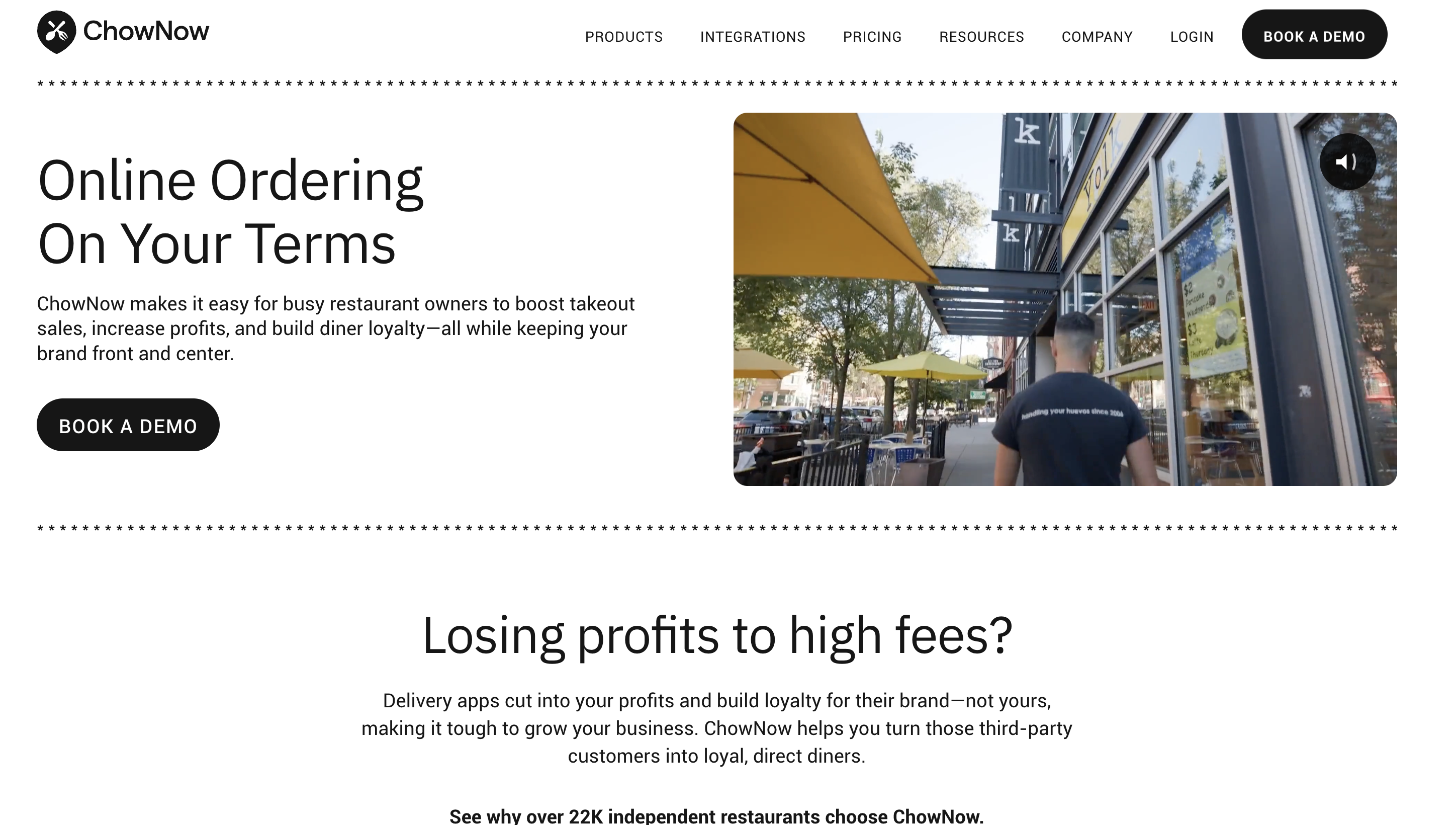
Pros:
- Zero commission fees on orders, with transparent monthly subscription pricing
- Branded mobile apps and websites that maintain your restaurant's identity
- Robust marketing tools including automated email campaigns and loyalty programs
- Direct integration with Google Food Ordering for enhanced visibility
- Comprehensive customer data collection and analytics dashboard
- Tableside QR code ordering capabilities for dine-in service
Cons:
- Higher monthly subscription costs compared to some competitors ($99-149/month)
- Setup fees of $199-399 depending on the selected plan
- Limited POS integration options compared to more technically-focused platforms
- Two-year contract requirement with early termination penalties
- Some users report occasional delays with technical support responses
Pricing: Monthly subscription of $99-149 plus one-time setup fee of $199-399; no per-order commissions.
Integrations: Supports 20+ POS systems including Toast, Square, Clover, and Revel.
What Customers Say:"ChowNow helped us reclaim our customer relationships from third-party apps. The branded ordering experience matches our restaurant's aesthetic perfectly, and we've seen a 40% increase in repeat orders since implementing their loyalty program." - David Chen, Spice House
Customer Rating: 4.4/5
10. Olo
Olo specializes in enterprise-grade digital ordering solutions for multi-location restaurants and chains. Their platform offers sophisticated features for complex operations, making it the preferred choice for larger restaurant groups seeking scalability and advanced functionality.
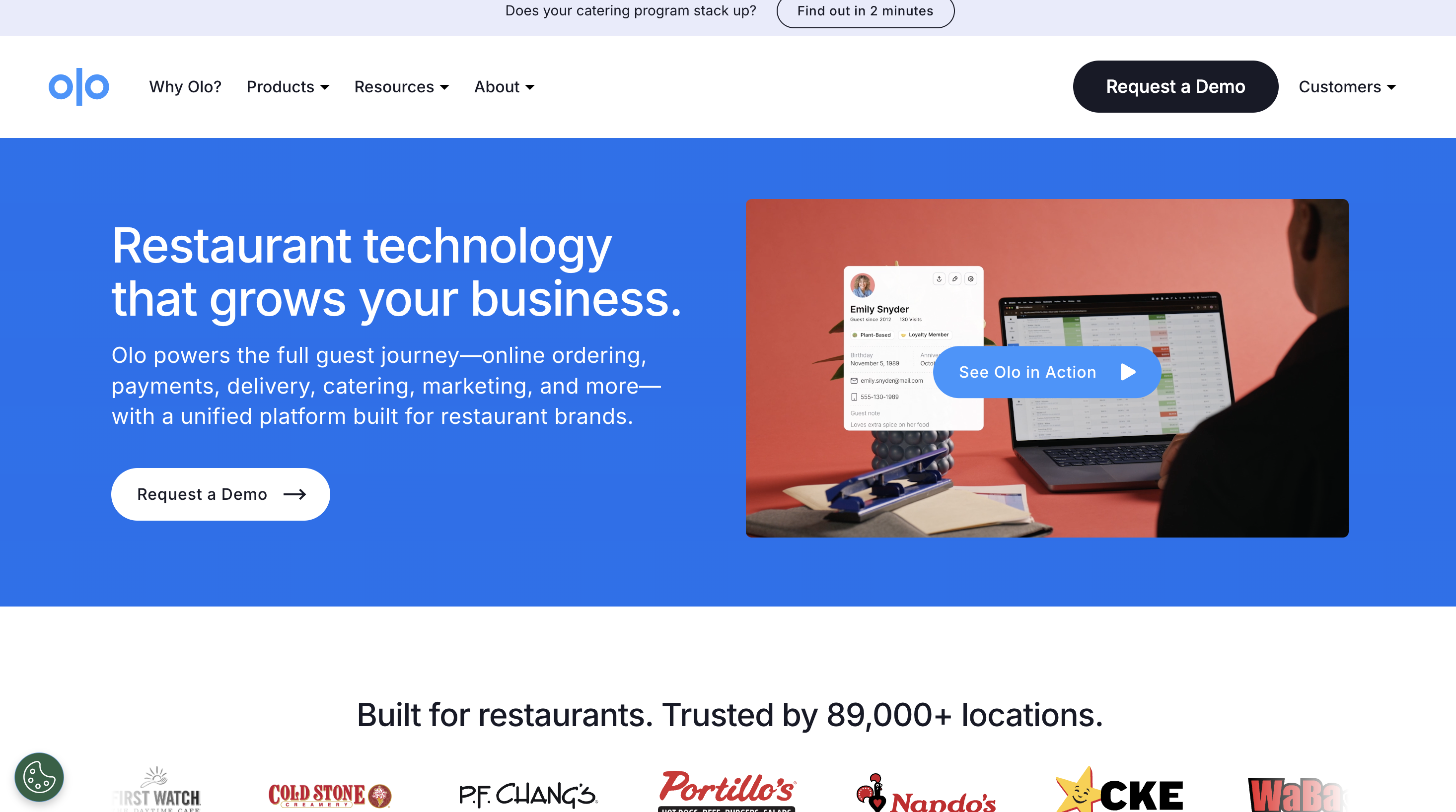
Pros:
- Enterprise-grade platform designed specifically for multi-location operations
- Sophisticated dispatch network that optimizes delivery across multiple providers
- Advanced order throttling and kitchen production management
- Comprehensive API ecosystem for custom integrations
- Robust data analytics and business intelligence tools
- Centralized menu management with location-specific customization capabilities
Cons:
- Enterprise pricing model puts it out of reach for independent restaurants
- Complex implementation process requiring dedicated IT resources
- Steeper learning curve compared to more straightforward platforms
- Less suitable for single-location operations with basic needs
- Requires longer contract commitments than most competitors
Pricing: Enterprise pricing model with custom quotes based on locations and order volume.
Integrations: Supports 100+ integrations including major POS systems, payment processors, and delivery services.
What Customers Say:"As a regional chain with 35 locations, Olo's enterprise capabilities have been transformative. Their centralized management tools allow us to maintain brand consistency while giving individual locations the flexibility they need. The dispatch network has optimized our delivery operations across multiple service providers." - Michael Thompson, VP of Digital, Coastal Grill Group
Customer Rating: 4.2/5
How to Choose the Right Online Ordering System For Restaurants
Selecting the right online ordering system for your restaurant depends on your specific needs and challenges. Restolabs addresses a wide range of pain points across different restaurant types, offering tailored solutions to help you grow your business. Here's why Restolabs stands out:
1. Define Your Core Requirements
- Business Model Assessment: Determine whether you need primarily pickup, delivery, or both capabilities
- Volume Expectations: Estimate your anticipated monthly online order volume
- Technical Infrastructure: Inventory your existing POS, payment systems, and other technology
- Growth Trajectory: Consider how your needs might evolve over the next 12-24 months
2. Evaluate Essential Features
- Menu Management: Assess how easily you can update items, prices, and availability
- Order Processing: Verify the system can handle modifiers, special instructions, and combos
- Customer Experience: Test the ordering flow from a customer perspective for intuitiveness
- Mobile Responsiveness: Ensure the platform works seamlessly across all devices
- Marketing Tools: Look for email integration, promo code capabilities, and loyalty features
3. Analyze Integration Capabilities
- POS Compatibility: Confirm direct integration with your existing point-of-sale system
- Payment Processing: Verify support for your preferred payment methods and processors
- Delivery Services: Check for integration with in-house or third-party delivery options
- Accounting Software: Assess how order data flows into your financial systems
4. Compare Pricing Structures
- Subscription Costs: Calculate total monthly/annual platform fees
- Transaction Fees: Identify any per-order charges or payment processing fees
- Setup Expenses: Account for onboarding, training, and implementation costs
- Contract Terms: Review minimum commitment periods and cancellation policies
- ROI Timeline: Estimate how quickly the system will pay for itself through increased sales
5. Assess Scalability and Support
- Peak Volume Handling: Verify the platform can manage high-volume periods without slowdowns
- Multi-Location Support: Ensure centralized management capabilities if you operate multiple sites
- Technical Support: Review availability, response times, and support channels
- Training Resources: Evaluate onboarding processes and ongoing education materials
- System Reliability: Research uptime guarantees and backup procedures
6. Prioritize Data Ownership and Security
- Customer Information: Confirm you maintain full ownership of all customer data
- Data Portability: Verify you can export information if you change platforms
- Security Standards: Ensure PCI compliance and robust data protection measures
- Privacy Policies: Review how customer information is used and protected
- Reporting Access: Assess the depth and accessibility of analytics and reporting tools
Ready to Transform Your Restaurant's Online Ordering Strategy?
Throughout this guide, we've explored how the right online ordering platform dramatically increases revenue through higher average order values, provides invaluable customer data for targeted marketing, and eliminates costly third-party commissions that eat into your profits. While implementing new technology always presents challenges, the financial and operational benefits of direct online ordering far outweigh the initial learning curve.
At Restolabs, we've designed our platform specifically to address the unique needs of independent restaurants and growing chains. Our commission-free model, seamless POS integrations, and comprehensive analytics give you complete control over your digital presence while providing the technical support you need at every step of your journey.
Ready to see the difference for yourself? Start your risk-free 30-day trial today and discover why thousands of restaurants trust Restolabs to power their online ordering success.
Frequently Asked Questions
An online ordering system helps reduce third-party commissions, streamline operations, and build stronger relationships with your customers. It also improves efficiency, profitability, and your restaurant’s online visibility which is essential to compete in today’s world.
RestoLabs offers a commission-free model, full customization, and complete access to customer data. Unlike competitors, it provides centralized tools for branding, loyalty, and customer engagement, ensuring your restaurant retains more revenue and builds lasting customer engagement.
Yes, RestoLabs integrates seamlessly with most POS systems, allowing you to synchronize online and in-store operations without disruptions. This ensures smoother workflows and accurate order management.
Definitely! RestoLabs is perfect for restaurants with multiple locations or franchises. Our platform makes it easy to manage all your sites from one place, keeping everything consistent and running smoothly.
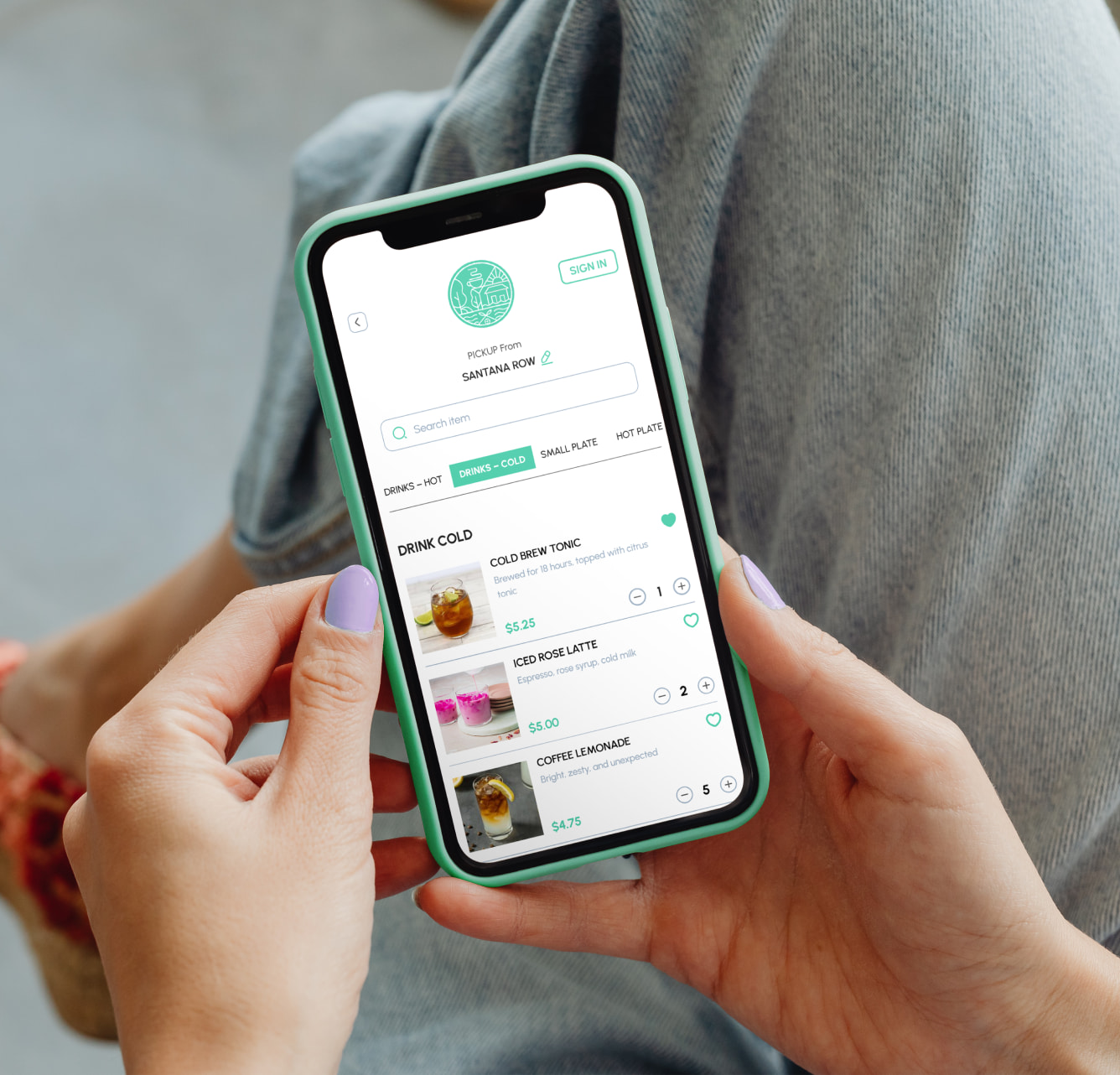

.gif)
.png)
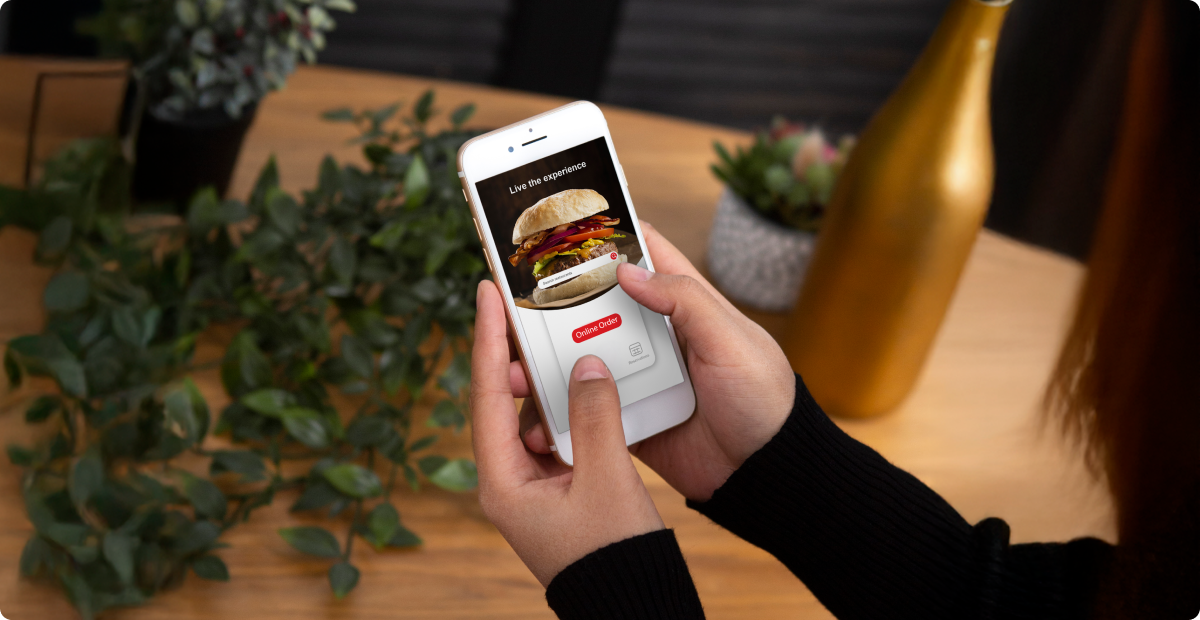

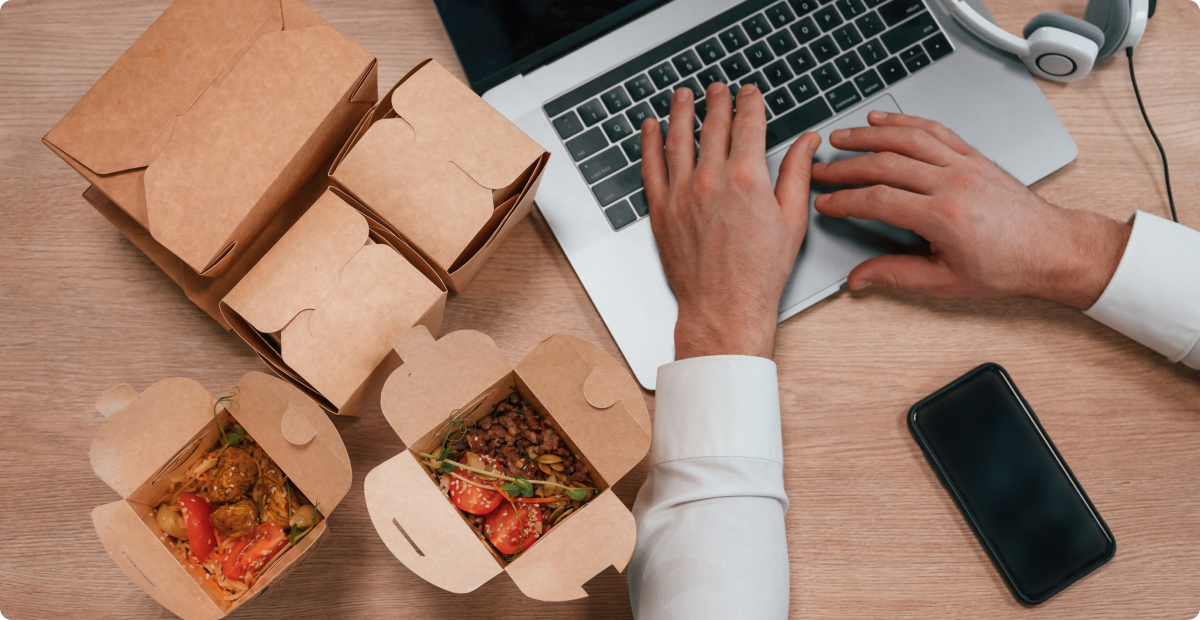
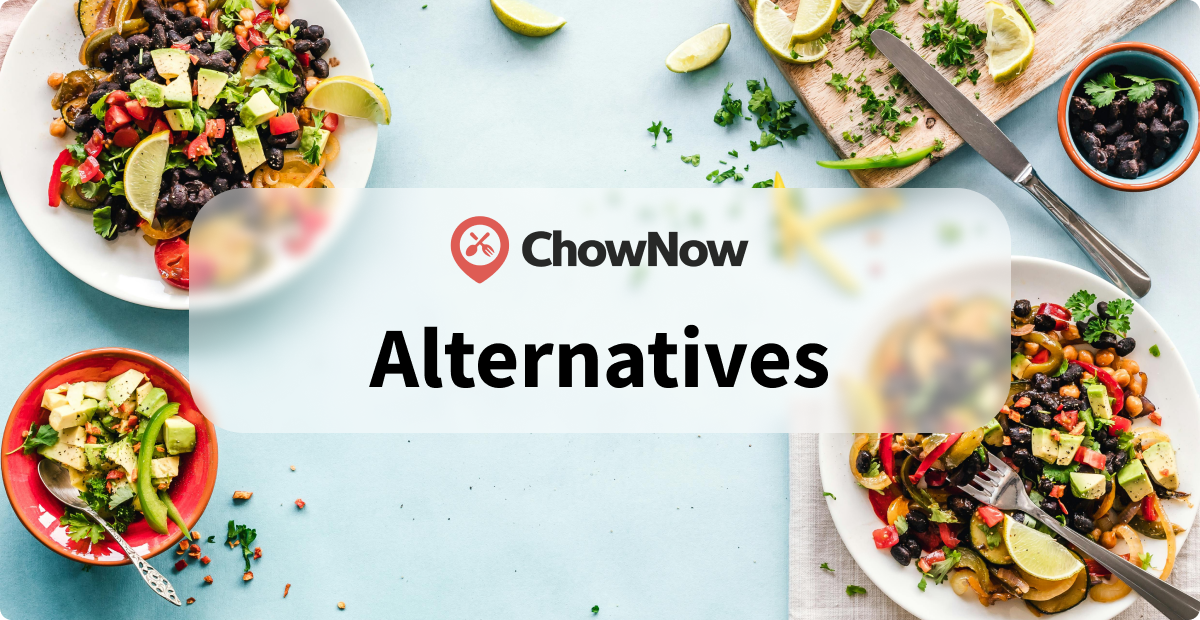
.png)
.png)
